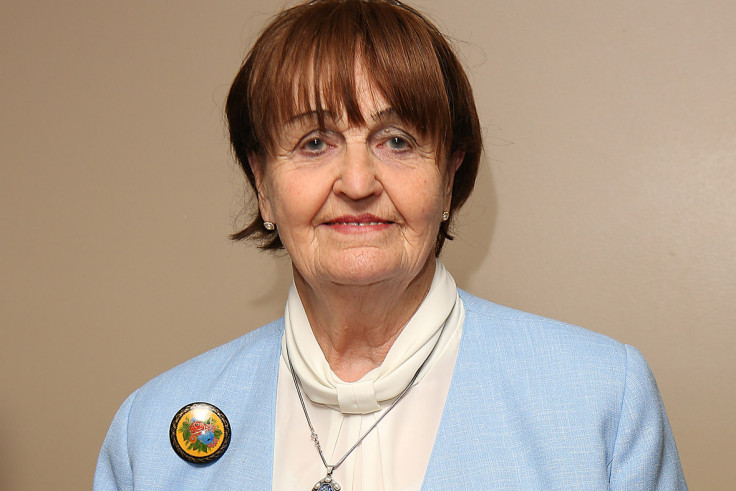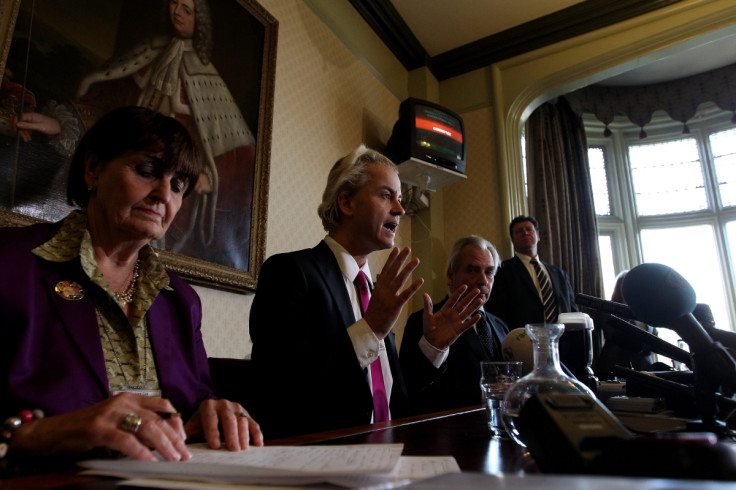Sharia law UK: Baroness Cox – 'The Suffragettes will be turning in their graves'

Baroness Cox has spent decades working in some of the world's most dangerous countries, travelling secretly to lawless regions of northern Nigeria and central Sudan. But in recent weeks it has been a battle closer to home that has monopolised the 78-year-old cross bench peer's time – taking on Britain's unregulated Sharia courts which she fears are operating a parallel Muslim legal system in the UK.
Her Arbitration and Mediation Services (Equality) Bill passed without amendment on its third reading at the House of Lords in January and is now heading for the Commons, where Cox believes it already has a good deal of support. It will either be presented as a private members bill or be taken up by the government, dovetailing nicely, she believes, with David Cameron's renewed focus on Muslim integration in Britain.
Inside Britain's Sharia courts, an IBTimes UK investigation

In a series of exclusive interviews and features this week, IBTimes UK investigates the scope and role of Islamic Sharia courts in Britain.
Speaking to Islamic scholars in London and the Midlands, pro-and anti-Sharia activists, politicians and British Muslims, this series explores the true role of Sharia councils and courts in Britain.
But the bill has been controversial. If accepted, it could seriously limit the power of dozens of Sharia courts in Britain, including introducing jail terms for scholars presenting themselves as judges and re-opening potentially thousands of cases where women may have been discriminated against. As a result, Cox has been criticised by some in the Muslim community for a bill that they say is Islamophobic, a claim that she denies.
"[That] is used by those people who don't like the bill or the problems it addresses to discredit me, to shut down the argument. I would just point out that I risked my life trying to help Muslims in Sudan just last week.
"I am there to help people who are victims of persecution and discrimination regardless of faith. Do not tell me I am anti-Muslim," Cox told IBTimes UK after returning from Sudan with her Humanitarian Aid Relief Trust (HART).
"They will always label you as racist very quickly. The truth may be uncomfortable but I will have to put up with the labels and hope that the truth will come out and that compassion will come through," she said.
Cox has been here before, of course. In 2009 she hit headlines after she joined Ukip peer Lord Pearson in inviting controversial Dutch politician Geert Wilders to show the anti-Islam film Fitna at the House of Lords. Wilders was banned from entering the UK by the then Home Secretary Jacqui Smith, a move criticised by Cox who argued that however unpalatable his views were, it was a freedom of speech issue. Wilders later overturned the ban and showed the film at the Lords.
I have cried with Muslim women that are suffering in this country. We are in a situation where we are at risk of having a parallel legal system – on the 800th anniversary of the Magna Carta. That is unacceptable
Two years later she first lodged her Arbitration and Mediation Services (Equality) Bill, which was re-launched in 2014 and passed in the Lords on 20 January. She said her interest in Sharia courts in Britain stemmed from her conversations with Muslim women in Britain, who have faced widespread sexism and discrimination in dozens of largely unregulated Sharia councils and courts across the country.
Many Muslim women, she argued, do not realise that Muslim marriage is not legally binding in Britain and when their husbands divorce them – which, under Islamic law, men can do verbally – they are left destitute. Similarly women who want to divorce their husbands are often blocked by numerous legal hurdles under Sharia law and discrimination by the overwhelmingly male court judges.
"I have cried with those Muslim women. They are suffering in this country and I cannot sit on those red benches and know that they are suffering out there in those closed communities. We have Emmeline Pankhurst's statue next to us in parliament. I can't let it happen. We are in a situation where we are at risk of having a parallel legal system – on the 800th anniversary of the Magna Carta. That is unacceptable," she said.

The bill proposed by Cox has a number of strains, but its main focus is to open up a debate on what is essentially a closed and secretive system, she said. She believes that established bodies such as the Muslim Arbitration Tribunal (MAT) in Nuneaton undoubtedly have a role for Muslims that want to resolve disputes in accordance with Quranic law, but there was worry that even these were over-stepping their mandate.
"What it will do is highlight what may be unacceptable practices in the Sharia law rulings. I am not arguing for the abolition of Sharia courts, because I believe in freedom of religion, [but] what I do argue for is the prohibition of those aspects of the rulings which are incompatible with British law, values, policies and principles," she said.
If the leaders of Muslim communities had done more to help those women I think that would be far more constructive way forward than just using the victim card.
One particular area of concern is child custody, which under British law is decided based on the best interests of the child but in Sharia law granted automatically to men, should they want it.
"The woman may be divorced and lose her kids – well that is totally against British policy and law. It is those kind of things that need to be exposed and addressed," said Cox.
The argument has been made that Cox, as a Christian, is not the right person to be spear-heading a reform of Islamic courts, particularly at a time when anti-Muslim feeling in Britain is running high and British Muslims already feel that they are being victimised by the government. But she doesn't agree: it is precisely because the Muslim establishment in Britain is not addressing the rights of women under Sharia that she has to.
"I spoke to the leadership of the Bradford mosque and I raised the issue of access to divorce. That women have to pay and men don't. And they have got no answer. It hasn't come from a Muslim member of the House of Lords. If they had done it, there would be no need for me to do it," she said, adding that she hopes British Muslims could get behind aspects of the law if it served to modernise certain aspects of Sharia.
As for the timing, Cox dismisses the argument that the bill is badly timed given a rise in hostility towards British Muslims in both the media and on the streets.
"I am sometimes a little impatient with those who oppose the bill because it is going to generate Islamophobia. It is helping Muslim women. It is not Islamophobic. If the leaders of the communities had done more to help those women and came on board with the bill then I think that would be far more constructive way forward than just using the victim card and saying it is increasing Islamophobia," she said.
On 27 January, IBTimes UK interviews Khola Hasan, a female scholar at the Leyton Islamic Sharia Council
© Copyright IBTimes 2025. All rights reserved.






















